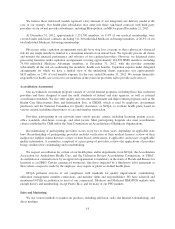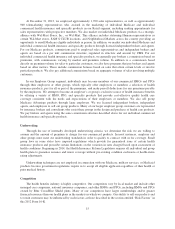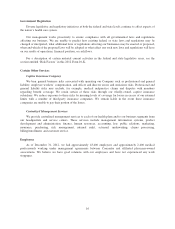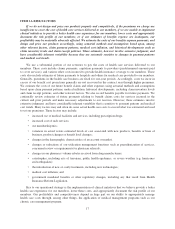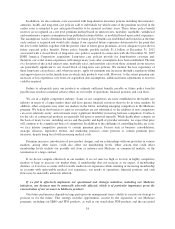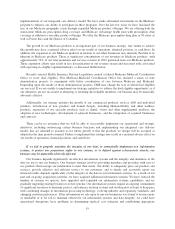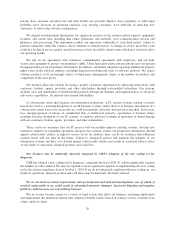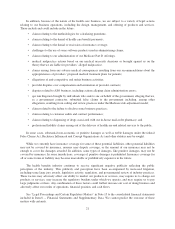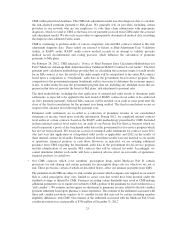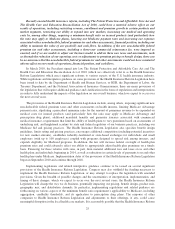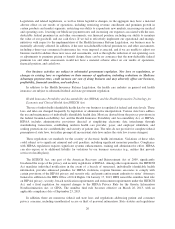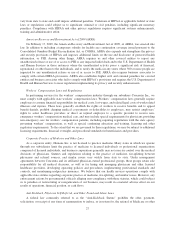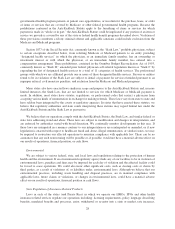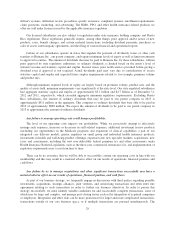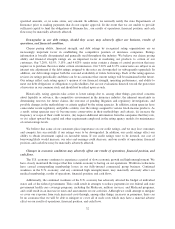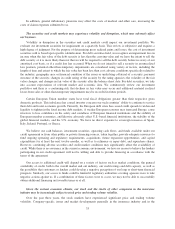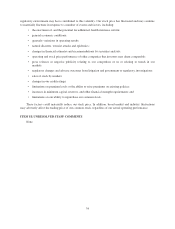Humana 2012 Annual Report Download - page 34
Download and view the complete annual report
Please find page 34 of the 2012 Humana annual report below. You can navigate through the pages in the report by either clicking on the pages listed below, or by using the keyword search tool below to find specific information within the annual report.Reinsurance and low-income cost subsidies represent payments from CMS in connection with the
Medicare Part D program for which we assume no risk. Reinsurance subsidies represent payments for
CMS’s portion of claims costs which exceed the member’s out-of-pocket threshold, or the catastrophic
coverage level. Low-income cost subsidies represent payments from CMS for all or a portion of the
deductible, the coinsurance and co-payment amounts above the out-of-pocket threshold for low-income
beneficiaries. Monthly prospective payments from CMS for reinsurance and low-income cost subsidies
are based on assumptions submitted with our annual bid. A reconciliation and settlement of CMS’s
prospective subsidies against actual prescription drug costs we paid is made after the end of the year.
Settlement of the reinsurance and low-income cost subsidies as well as the risk corridor payment is
based on a reconciliation made approximately 9 months after the close of each calendar year. This
reconciliation process requires us to submit claims data necessary for CMS to administer the program.
Our claims data may not pass CMS’s claims edit processes due to various reasons, including
discrepancies in eligibility or classification of low-income members. To the extent our data does not
pass CMS’s claim edit processes, we may bear the risk for all or a portion of the claim which otherwise
may have been subject to the risk corridor provision or payment which we would have otherwise
received as a low-income or reinsurance claim. In addition, in the event the settlement represents an
amount CMS owes us, there is a negative impact on our cash flows and financial condition as a result
of financing CMS’s share of the risk. The opposite is true in the event the settlement represents an
amount we owe CMS.
• The Budget Control Act of 2011, enacted on August 2, 2011, increased the United States debt ceiling
conditioned on deficit reductions to be achieved over the next ten years. The Budget Control Act of
2011 also established a twelve-member joint committee of Congress known as the Joint Select
Committee on Deficit Reduction to propose legislation to reduce the United States federal deficit by
$1.5 trillion for fiscal years 2012-2021. The failure of the Joint Select Committee on Deficit Reduction
to achieve a targeted deficit reduction by December 23, 2011 triggered an automatic reduction,
including aggregate reductions to Medicare payments to providers of up to 2 percent per fiscal year.
Although these reductions are scheduled to take effect on March 1, 2013, at this time it is unclear how
this automatic reduction may be applied to various Medicare healthcare programs or the timing of
when such reductions may actually begin. We expect that if such reductions were to occur, there would
be a corresponding substantial reduction in our obligations to providers. Due to the uncertainty around
the timing or application of any such reductions, there can be no assurances that we could completely
offset any reductions to the Medicare healthcare programs applied by the Budget Control Act of 2011.
• We are also subject to various other governmental audits and investigations. Under state laws, our
HMOs and health insurance companies are audited by state departments of insurance for financial and
contractual compliance. Our HMOs are audited for compliance with health services by state
departments of health. Audits and investigations are also conducted by state attorneys general, CMS,
the Office of the Inspector General of Health and Human Services, the Office of Personnel
Management, the Department of Justice, the Department of Labor, and the Defense Contract Audit
Agency. All of these activities could result in the loss of licensure or the right to participate in various
programs, including a limitation on our ability to market or sell products, the imposition of fines,
penalties and other civil and criminal sanctions, or changes in our business practices. The outcome of
any current or future governmental or internal investigations cannot be accurately predicted, nor can we
predict any resulting penalties, fines or other sanctions that may be imposed at the discretion of federal
or state regulatory authorities. Nevertheless, it is reasonably possible that any such outcome of
litigation, penalties, fines or other sanctions could be substantial, and the outcome of these matters may
have a material adverse effect on our results of operations, financial position, and cash flows. Certain
of these matters could also affect our reputation. In addition, disclosure of any adverse investigation or
audit results or sanctions could negatively affect our industry or our reputation in various markets and
make it more difficult for us to sell our products and services.
24


